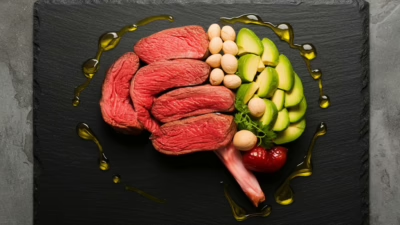The ketogenic diet helps you lose weight by switching your body’s fuel source from carbs to fat. By limiting your daily carbs to 50 grams or less, your liver starts producing ketones, which become your brain and muscles’ primary energy source. You’ll want to focus on eating 60-80% fat, 20-30% protein, and 5-10% carbs while staying properly hydrated and tracking your macros carefully. Most people enter ketosis within 2-4 days and can expect to lose 1-2 pounds per week when following the diet correctly. Beyond weight loss, you’ll likely experience improved mental clarity, stable blood sugar, and reduced inflammation – and that’s just the beginning of keto’s benefits.
The Science Behind Ketosis

While many people associate ketosis with modern dieting trends, it’s actually a natural metabolic state that occurs when your body shifts from using glucose to burning fat for fuel.
When you restrict carbohydrates to around 50 grams or less per day, your body enters this remarkable fat-burning state, making ketosis for fat loss an effective strategy for many people.
During this process, your liver begins converting fatty acids into ketones, which serve as an alternative energy source for your brain, muscles, and other organs.
You’ll typically enter ketosis within 2-4 days of following a very low-carb diet, though everyone’s timeline can vary.
When it comes to keto and weight loss, your body becomes incredibly efficient at using stored fat reserves for energy, which often leads to significant fat loss results.
What makes fat-burning with keto unique is that your body maintains stable ketone levels, usually below 3 mM, which is completely different from the dangerous state of ketoacidosis.
Your body naturally regulates these ketone levels, ensuring you stay within a safe, therapeutic range while maximizing your fat-burning potential.
Research shows that low-carb diets can significantly improve blood sugar control while promoting sustainable weight loss.
Common Weight Loss Mistakes
Understanding ketosis is just one part of successful weight loss – knowing what mistakes to avoid is equally important. Even when following a keto diet, you’ll need to be mindful of common pitfalls that can slow your metabolism and hinder progress.
Many dieters overlook basic needs, like drinking enough water and getting adequate fiber, which are crucial for keeping your metabolism running smoothly. You might be making mistakes with your exercise routine, such as doing the same workouts repeatedly or overestimating calories burned during physical activity. These habits can stall your weight loss, even on keto.
Another common error is having unrealistic expectations about how quickly you’ll lose weight. While keto can be effective, aiming to lose more than 1-2 pounds per week isn’t sustainable or healthy.
You’ll also want to avoid relying too heavily on “keto-friendly” processed foods, as they can contain hidden ingredients that affect your progress. Instead, focus on whole foods, proper portion sizes, and a balanced approach that includes regular exercise.
Consider incorporating some low-glycemic carbs into your diet plan, as they can help stabilize blood sugar levels and control hunger cravings.
Tracking Macros For Success

The successful implementation of a keto diet hinges on tracking your macronutrients accurately. By keeping tabs on your fat, protein, and carb intake, you’ll ensure your body stays in ketosis, where it efficiently burns fat for energy.
Unlike standard low-carb diets, keto requires much stricter carbohydrate restriction to achieve its metabolic effects.
You’ll want to aim for 60-80% of calories from fat, 20-30% from protein, and just 5-10% from carbs to maintain this metabolic state.
Here’s what you’ll need to track successfully:
- A reliable macro tracking app with a comprehensive food database
- A food scale to measure portions accurately
- A personalized macro calculator to determine your specific needs
- A meal planning system to stay organized
Using these tools, you’ll find it easier to stay within your macro targets and avoid common pitfalls. Start by weighing and logging your food before eating, and don’t forget to scan barcodes when available for quick, accurate entries.
As you progress, you might need to adjust your macros based on your results and activity level. Remember, consistency in tracking leads to better outcomes, helping you overcome plateaus and achieve your weight loss goals more effectively.
Meal Planning Essentials
Successful meal planning serves as the cornerstone of a sustainable keto lifestyle. By taking time to plan your meals in advance, you’ll set yourself up for long-term success on your weight loss journey.
Start by stocking your kitchen with keto-friendly staples, including quality proteins, healthy fats, and low-carb vegetables that’ll form the foundation of your meals.
You’ll want to create detailed shopping lists and stick to them religiously, ensuring you’ve got everything needed for your weekly meal prep.
Consider batch cooking on weekends, where you can prepare proteins like grilled chicken and slice vegetables for quick assembly during busy weekdays.
When planning your meals, remember to balance your macros by including generous portions of protein, plenty of keto-approved vegetables, and healthy fats like avocado or olive oil.
Don’t forget to customize your meal plan to fit your preferences and schedule, making it easier to maintain consistency.
Keep your daily carbs under 50 grams, stay hydrated, and use portion control to meet your calorie goals.
Fat burning metabolism increases naturally as your body adapts to reduced carbohydrate intake.
If you’re feeling overwhelmed, don’t hesitate to consult with a healthcare professional for personalized guidance.
Health Benefits Beyond Weight Loss

While establishing healthy eating habits through meal planning is important, keto’s advantages extend far beyond shedding pounds. When you follow a ketogenic diet, you’re not just transforming your body composition, you’re also improving your overall health in remarkable ways.
- Your heart health improves significantly, as keto helps lower blood pressure and boost good cholesterol while reducing harmful triglycerides.
- Your brain function gets enhanced, with many people reporting better mental clarity and focus when running on ketones instead of glucose.
- Your blood sugar levels become more stable, which is particularly beneficial if you’re managing diabetes or pre-diabetes.
- Your inflammation levels often decrease, which can help reduce chronic pain and improve various health conditions.
Beyond these immediate benefits, you’ll likely notice that your appetite naturally decreases, making it easier to maintain your new eating habits.
The keto diet’s impact on neurological health is also promising, with research showing potential benefits for conditions like epilepsy and Alzheimer’s disease.
Your metabolic health may improve too, as your body becomes more efficient at using fat for fuel, leading to better energy levels throughout the day.
Though keto differs from a plant-based approach, incorporating nutrient-dense foods can further enhance its cardiovascular benefits.
Long Term Success Strategies
Maintaining long-term success on keto requires more than just following a strict meal plan – it demands a comprehensive lifestyle approach.
You’ll need to focus on creating sustainable habits that you can stick with, while ensuring proper nutrition through careful food choices and regular monitoring.
To make keto work for the long haul, you’ll want to keep your daily carbs between 20-50 grams while emphasizing healthy fats like olive oil and avocados.
It’s crucial to include plenty of vegetables for fiber and nutrients, and you’ll need to maintain adequate protein intake to preserve muscle mass.
Don’t forget to track your progress and make adjustments when necessary.
You can enhance your success by building flexibility into your approach.
Consider incorporating occasional periods of higher carb intake, or gradually transitioning to other low-carb eating styles that you might find more sustainable.
Remember to schedule regular health check-ups and monitor your electrolytes and hydration levels.
While research shows sustained weight maintenance is possible on a ketogenic diet, careful attention to nutrient intake is essential for long-term health.
You’ve learned the key elements of successful keto weight loss, from understanding ketosis to avoiding common pitfalls. By tracking your macros carefully, planning nutritious meals, and implementing long-term strategies, you’re well-equipped to achieve your goals. Remember, keto isn’t just about losing weight, it’s about transforming your relationship with food. With patience and dedication, you’ll find that sustainable weight loss through keto is within your reach.



